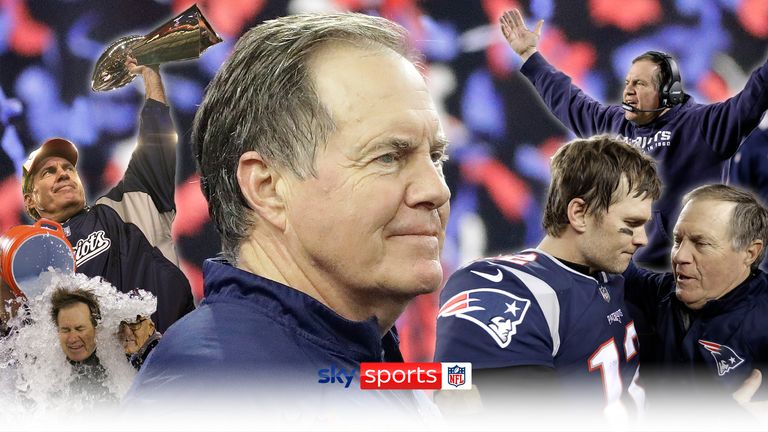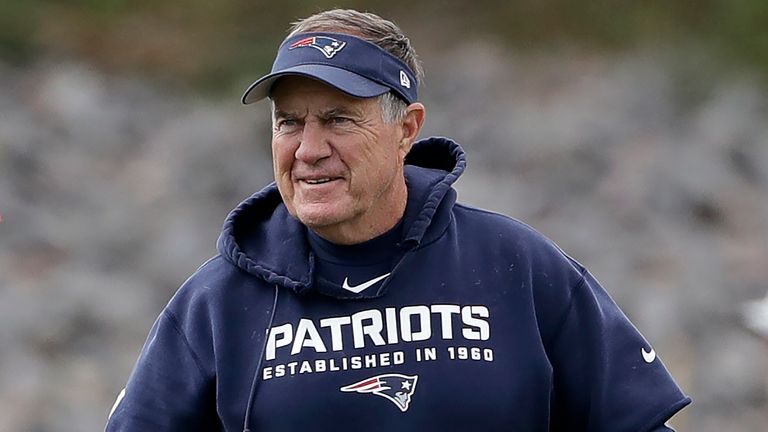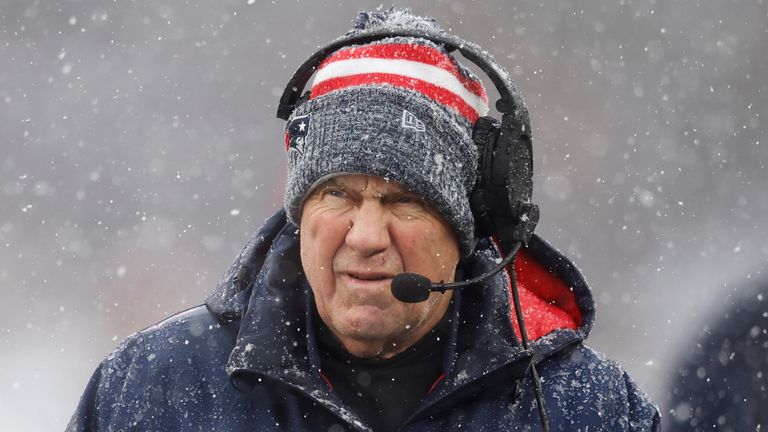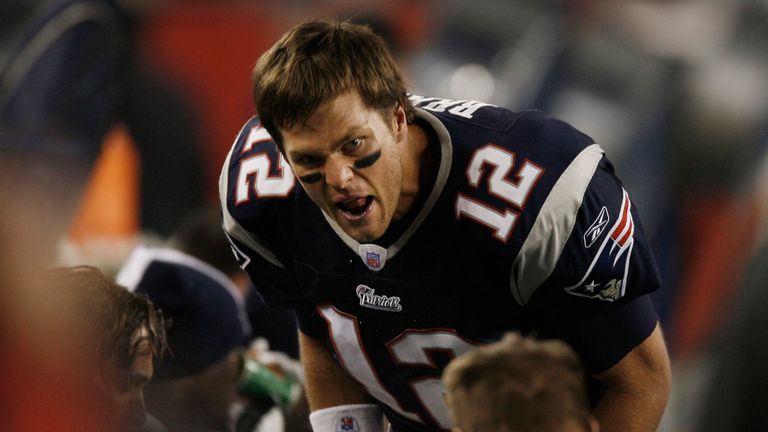Bill Belichick: The end of an era for the New England Patriots and the NFL's greatest head coach
The Bill Belichick era came to an end on Thursday as the legendary NFL head coach parted ways with the New England Patriots after 24 years, during which time he won six Super Bowl rings as part of one of the greatest dynasties in league history.
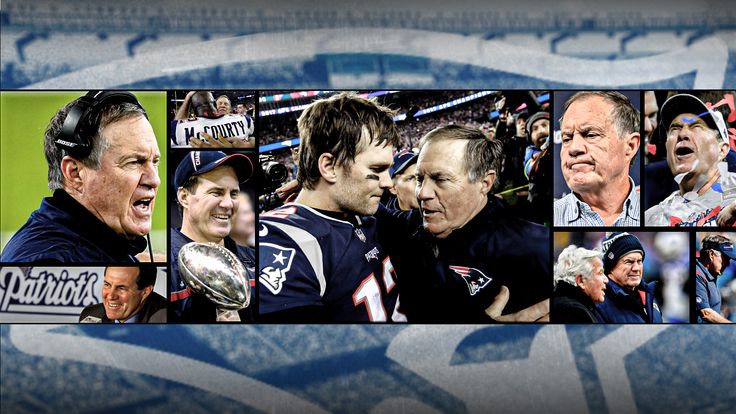
Saturday 13 January 2024 16:49, UK
Against all the odds and villainous portrayals, contrary to bleak expectations and gloomy projections… Bill Belichick once dressed as a pirate to a Randy Moss-led roller-skating Halloween party with the New England Patriots.
Not the odds-and-expectations-clobbering Super Bowl tale you were thinking of, huh? Not the evil genius masterplan you were anticipating, huh?
With storied Belichickian philosophies come trademark Jekyll and Hyde-isms to the greatest head coach in NFL history, from whom rare jesting and joshing became a loveable contrast to the typical motionless exterior, icy media dealings, mumbling remarks and relentless scent for destruction on which his Patriots empire was built.
- Belichick leaves Patriots after 24 seasons as head coach
- Bears and Vikings to host games at Tottenham as NFL returns in 2024
- Titans fire head coach Vrabel in shock decision
Only those that played and worked for him in Foxboro were afforded the best of both steely-eyed-killer Belichick and out-of-office Belichick, the consistency at which the 'Patriots Way' remained in-house - be it analysis, outlook, smiles or fallout - fuelling his side's self-imposed detachment from the rest of the league on its rise to supremacy. And while Belichick sought to fortify an all-conquering private family environment like no other, he similarly had the unique ability to strip away sentiment when deciding it was time for players or his team to move on.
Over two decades he would become the most ruthless and successful winner to grace the NFL sidelines. After 24 years, six Super Bowl titles from nine Super Bowl appearances, nine AFC Championships and 17 AFC East division titles, the Belichick era is over in New England.
Trending
- Neville: Clattenburg should resign after Forest statement
- Keane: I almost dislike Man Utd | Carra: No way Ten Hag stays
- Garcia knocks Haney down three times in shock win
- Papers: Antony under fire for aiming celebrations at Coventry players
- Bellingham stuns Barca with last-gasp Clasico winner
- Forest accuse VAR official Attwell of being a Luton fan
- World Snooker Championship 2024: Draw and schedule
- Transfer Centre LIVE! Nagelsmann extends Germany contract
- 'Stop focusing on unavailable drivers!' - Horner warns Wolff over Verstappen
- Mercedes reveal upgrades plan after 'not good enough' China
"You shouldn't be able to do what Bill Belichick and the Patriots did," said Sky Sports NFL's Neil Reynolds.
On Thursday the Patriots and Belichick officially announced they are to part ways this offseason in the wake of a 2023 campaign that saw them finish with a 4-13 record, the landslide worst of their time together. Belichick's Patriots as the NFL knew them had gone; the omniscience fizzled, the power to raise the level of non-superstars faded, his recruitment as general manager coughed up flop investments, coaching hires backfired and the situation at quarterback became the face of turmoil as a winning machine was exposed to its heaviest dose of retaliation following years of staggering dominance.
Everybody has their prized Belichick-Patriots moment, the pirate costume and beyond. It might be Belichick's menacing smirk while exploiting a game-clock loophole to chew 1.30 off the clock while preparing to punt against the New York Jets. It might be full-nerd Belichick snowballing in enthusiasm while spending a full nine minutes explaining the history of long snappers in football and the shift away from hybrid special teams players.
It might be Belichick's face lighting up during a meeting with Tom Brady over how they planned to play against all-time-great Baltimore Ravens safety Ed Reed, the pair revelling in one another's unrivalled expertise against a worthy challenger. It might be Belichick labelling punter Brett Kern as the Tennessee Titans' best player, such is his adoration for fine special teams play, or his sudden break of character to throw his arm forward in fiery celebration at the sight of Brady scrambling for a first down against the Kansas City Chiefs. Though for most, an unprecedented reign of winning will probably do the trick.
At the root of Belichick's might in New England was a shrewd eye for the market, tied to one of the most innovative and influential defensive minds in history and, crucially, the presence of the NFL's greatest ever quarterback in Brady. He and Brady, between them, transformed the Patriots into chief rebels to the league's desired parity, which by purpose seeks to eradicate one-team dominance and preserve competitive balance through its worst-to-first Draft order, its salary cap regulations and an equal split of television revenue. Pish posh to parity; they won it all. Again and again and again, times two.
"Being a part of that team was such a throwback to the reality and the truth of what I know football to be about," said Scott Pioli, a three-time Super Bowl champion executive with the Patriots from 2000-2008, in an interview with Sky Sports. "And what Bill knew football to be about is that it was always more about the collective, and the team and the group."
Was it Belichick? Was it Brady? The debate rages on, the only reason that acceptance it was both remains slow in coming being that football has never experienced a prolific coaching-quarterback tandem quite like it.
"I think people sometimes forget those first two Super Bowls that we won, how good our defense was," Pioli continued. "Tommy (Tom Brady) was still Tommy, this was before he was Tom Brady. If you look at how he played, he played well, he didn't lose games, but he wasn't playing as spectacularly as he became as time went on."
Brady has his well-documented hero moments as the quarterback capable of shape-shifting to any system, diagnosing any defensive scheme, flipping a lost game on its head and remaining the coolest cat on the field when everything is on the line in the biggest moments. But rarely in his time with the Patriots did he operate with anything less than a top-10 Belichick-cultivated defense behind him, be it the unit that blunted the Rams and their 'Greatest Show on Turf" offense at Super Bowl XXXVI or the unit that limited the Indianapolis Colts' No 1-ranked offense to three points in the playoffs en route to winning Super Bowl XXXIX, or the unit that restricted Sean McVay's No 2-ranked Rams offense to three points at Super Bowl LIII.
"Those teams that won championships, we weren't this polished group yet until really the 2004 Championship team," Pioli continued. "And we were a team who were about the team. It was just like that first Super Bowl, when we were told the players were going to be introduced individually, and our players said 'to heck with them' and ran out onto the field as a team and owner Robert Kraft said he would pay the fine.
"We had built our football team in a way that we had a lot of players that other teams did not want. Other teams had discarded players that came in for very low salaries because they weren't star players yet. They came to our team. They did the work, they sacrificed. And I think one of the things that I feel bad about retrospectively is because our players bought into the team concept so much that they have never gotten enough public respect for how good they were."
Belichick's sides of the past would feast on quarterbacks, young and old, as the ultimate gateway acid test for play-callers and their respective offense.
He could craft cruel mirages pre-snap before ambushing an ill-guided decision once the ball was out and a quarterback had slammed on the panic button. He matched it with the nous to command offensive tendencies and tempo: if you could be beaten on the ground, he would beat you on the ground; if you could be beaten through the air, he would beat you through the air. He cared little for what was in-fashion across the league. His Patriots pounced on college football's spread offense before the rest, they revolutionised multiple tight end sets, they changed the landscape for pass-catching running backs, they passed when the league said to run and ran when the league said to pass. Belichick and his Patriots became their own fashion.
Belichick continued to demonstrate his ability to turn out a competitive defense as a dictator of trends for the best part of the two decades. From 2012-2022 his defense ranked third in the league in EPA/play as well as second in dropback EPA, some perhaps forgetting about a unit that finished third in EPA/play as recently as 2022. This year they still managed to nestle in at eighth in EPA/play, a storyline lost amid the catastrophic failings of their offense.
If other teams zigged with Belichick, he zagged back, and so on and so forth. Behind the silverware and the accolades accumulated over the years is the role of string-puller to multiple chapters of scheme and personnel philosophies across the NFL.
When the league began to rave about the ability to rush the passer with only four men, Belichick was already among the best at it as he controlled protection slides with lop-sided fronts to create one-on-one matchups on the outside. As the league leaned towards two-high safety coverages to reduce chunk plays downfield, Belichick remained true to single-high looks as one of the leading advocates for middle-of-the-field coverage, daring quarterbacks to throw riskier passes outside the numbers, and to good effect.
He has been the beacon of position-less football on defense, as much arguably still reflected in the post-Brady years with his tendency to rotate a Kyle Dugger, Jabrill Peppers or an Adrian Phillips down into box-tackler linebacker roles, or shift off-ball linebacker Jahlani Tavai over to the slot. It is another reason inside linebackers coach Jerod Mayo is so highly thought of in Foxboro as a man who encounters the blurred lines between Patriots safety and linebacker as closely as anybody.
Belichick and the newly-retired Nick Saban were revelling in the value of defensive flexibility in Big Nickel packages before football bought into the use of an extra safety as a run-savvy hybrid linebacker/corner who could man the slot; Belichick, helped by his own staple use of tight ends, recognised quickly that colleges were churning out big-bodied tight ends armed with the skillsets of a wide receiver, not only inspiring the use of extra safeties but changing the way defensive backs are evaluated.
And while he may not have been the first on this occasion, Belichick - similar to beefing up defensive lineman to combat the run in past years - decided to fight back against the modern mobile quarterbacks who could escape the pocket and throw on the run by adding lighter, more athletic sideline-to-sideline linebackers with the range and speed to attack a chapter of horizontal offense.
It is when reminding of the impact Belichick has had on the league for 20 years that further underlines the unnatural position in which he found himself. When it seemed like there were question marks, they always had something: a cut-price Patrick Chung deal to answer a necessity, a James White role as Brady's perfect utility man and reflection of Belichick's trend-setting pass-catching backs, a 1,000-yard LeGarrette Blount season, a star Danny Amendola appearance in the playoffs, a first-round running back in Sony Michel with whom to ignore running back draft narrative and use to control the ground game on the way to a Super Bowl.
Belichick, Brady and 'The Patriot Way' became the perfect villain, teasing protagonists into false hope with slow starts or marquee departures before inflicting brutal knockouts built on seasoned situational poise.
In 2014 he famously repeated 'We're onto Cincinnati' five times while speaking to reporters following the Patriots' crushing 41-14 loss to the Chiefs, turning his attention to the next week's matchup with the Bengals. Belichick's team were counted out, only to go on and beat the Seattle Seahawks at Super Bowl XLIX four months later.
Belichick's Patriots were never out, famously overcoming a 28-3 deficit to stun the Atlanta Falcons into perennial ridicule at Super Bowl LI, recovering from a dreadful start to suffocate Kyle Shanahan's all-singing-and-dancing offense in the process.
This time they were out, their downfall partly the product of Belichick and New England's decision to let Brady hit free agency before his powers had diminished. He packed up in 2020, headed for Florida and won a Super Bowl in his first season with the Tampa Bay Buccaneers.
By now offense had spiked in value and explosiveness across the league, with the reduction of a Brady leaving even a top-tier Belichick defense exposed as quarterback disparity leaned heavily in favour of a brimming AFC. It was the beginning of an end that would have arrived sooner were not for a Patriots defense that refused to lie down.
Cam Newton arrived as little more than a make-shift solution when Brady departed, sparking momentary intrigue upon his arrival as a free agent as Josh McDaniels sought to marry an option-friendly offense to a quarterback possessing a completely different skillset to his predecessor. The following year they turned to what felt their true reply to Brady's exit by drafting Mac Jones in the first round, bringing onboard the timing and rhythm passer who had fed a star-studded cast of receivers at Alabama.
Belichick turned the page on his cut-price prowess of the past and spent $163m in free agency, over $80m of which went on Jonnu Smith and Hunter Henry as he looked to revitalize the multiple tight end sets synonymous with his winning teams of years gone by through Rob Gronkowski and Aaron Hernandez. McDaniels reverted to quick game traits while cushioning Jones with a play-action offense and a solid running game as the rookie compiled a 10-7 record while completing 67.6 per cent of his passes for 3,801 yards, 22 touchdowns and 13 interceptions as the most efficient quarterback in his class.
McDaniels departed to become Las Vegas Raiders head coach at the end of the season, Belichick handed the keys to defensive-minded Matt Patricia and newly-fired New York Giants head coach Joe Judge, and fallout ensued. Patricia and Judge between them elected to shift the approach on offense away from the comfort zone of Jones - the results being sideline tension, a losing season and more change. Back came Bill O'Brien this offseason with the task of patching up a sinking ship, only for Jones to regress to the point of no repair. The Patriots offense finished 31st in total yards, 28th in passing, 26th in rushing, 31st in scoring and 31st in EPA/play, making for the ugly end that had come to never be expected for a Belichick team.
Quarterback is king, maybe more than ever, and Belichick couldn't find his next. But he still has a chance.
He will coach on, with Justin Herbert and the Los Angeles Chargers among the more attractive suitors amid his pursuit of another ring and Don Shula's all-time wins record for a head coach. A talent-loaded quarterback with weapons around him and a defense in need of a Belichick brain; sounds fitting.
Belichick is the defensive mind that shaped a generation of football, and the cold-hearted winner with an aura of inevitability like no other. He departs New England as the greatest to do it, perhaps never to be topped. In Belichick style, he is hungry for more.
